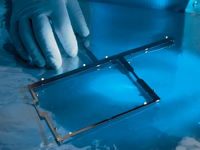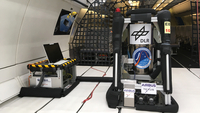With the grant notification, the eagerly awaited starting signal for a funded joint research project called "LiquiDrone" for the storage of liquid hydrogen (LH2) as a sustainable energy carrier for drones finally reached RST in June 2022.
The Federal Ministry of Digital Affairs and Transport (BMDV) is funding the LiquiDrone project with a total of 892,000 euros. Federal Minister Dr. Volker Wissing presented the funding certificates on Wednesday.
LiquiDrone’s focus of research is an intelligent liquid hydrogen tank system and its functional proof. Twelve liters of liquid hydrogen (an equivalent of about 850 grams) are to be safely stored at a temperature of -253 °C for the duration of the mission and made available for electric drone propulsion via a fuel cell system. The increased energy efficiency compared to conventional H2 tanks with gaseous hydrogen opens completely new fields of application for the use of drones (UAS). Using LiquiDrone as an example, with targeted flight times of up to 10 hours, the radius of action for transports could be greatly increased while using sustainably produced hydrogen. Time-consuming inspections in hard-to-reach places could also be carried out much more cheaply and, above all, more safely using such unmanned aerial vehicles.
Within this exciting technology project, which is scheduled to run until December 2023, a seven-member team from RST is taking care of the systems engineering as well as the development of a smart integrated interface of the tank to an existing UAS and specific electronics for complex measurement and control purposes, in addition to managing the consortium and coordinating all development activities.
The research project is supported by three joint partners with special expertise from Mecklenburg-Vorpommern and Hamburg.
For example, ZAL (Zentrum für Angewandte Luftfahrtforschung GmbH) is providing the LiquiDrone project with their "ZALbatros", a UAS that has already been tested successfully with a pressurized hydrogen tank and is developing an energy management system for optimized use of the cryogenic hydrogen. ZAL will also take care of handling the liquid hydrogen, overall integration, and system testing.
BaltiCo GmbH, a company specializing in fiber composites, is developing and manufacturing a lightweight and thermally optimized cryogenic tank container, whereas the Chair of Engineering Mechanics/Dynamics at the University of Rostock is working on the development of an algorithm to reliably determine the liquid hydrogen level in the LH2 tank.
The expected results of LiquiDrone generate an important contribution on the way to sustainable use of alternative energy sources in aviation and industry.

Project „LiquiDrone“ - funded by Federal Ministry of Digital Affairs and Transport (BMDV). Joint partners: BaltiCo GmbH, Universität Rostock, ZAL - Zentrum für Angewandte Luftfahrtforschung GmbH. // Source: RST
Contact
Dr. Holger Topp
Cluster Manager Cabin R&T, Architecture & New Development
+49 381 56 686+49 171 6795 106h.topp[at]rst-rostock.de
Related topic
Related news & events

news //
01.04.2020
Gap protection grids for IPP Greifswald

news //
16.10.2018


